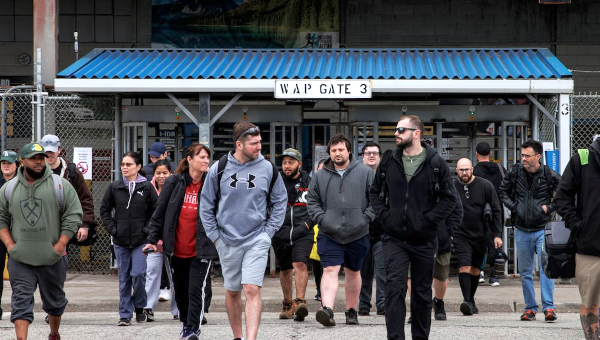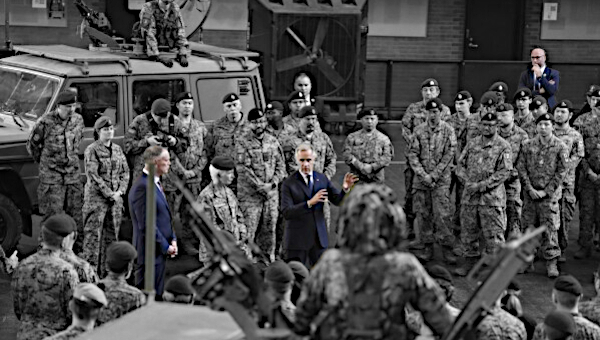Rob Ford and the Rise of the Municipal Right
For years, mayoral candidate Rob Ford has presented himself as the champion of the ‘little guy’ and a tax fighter. The reality is that he inherited a printing business from his father – a member of the Harris Government – and has used the wealth from that business to pay for his office and supplies – something very few ‘little guys’ can do.
It is clear that it would be a disaster for workers in Toronto if Ford were to become mayor with a right-wing dominated council. He has promised to use his own borough of Etobicoke as a model – a place where garbage collection is privatized. He has promised to cut costs and go after the city’s unions. He has openly said he would fight to stop immigrants from coming to Toronto and stop funding Pride Week. He also has said he would, in essence, cancel Transit City – the first serious expansion of public transit in decades.
Another candidate in the election is George Smitherman, the previous Ontario Minister of Health. In that position, he oversaw the debacle in Ontario of the computerization of health records that saw costs soar into the billions as contractors jacked up costs and made off like bandits. He has also openly suggested privatizing some services in the city and rolling back gains made by the city unions. A vote for Smitherman is a vote for privatization and Public-Private Partnerships (P3s).
Joe Pantalone, long-time city councillor, is seen by many as the candidate of the left. He is the only candidate who has promised not to privatize services and to maintain commitments to building public transit.
How Did We Get Here?
This has raised many questions about how Ford has emerged as the front runner and how it is that the two top candidates are open about privatizing services and possibly selling off city assets like hydro or using P3s to fund other initiatives. Some have blamed the city unions for striking two summers ago; others have claimed it is because of a shift to the right of ordinary working people. Neither of these is correct.
The rise of Ford cannot be explained without looking at the outcome of the city workers strike in 2009 and the silence of the ‘left’ on council and the actions of Mayor David Miller.
Toronto’s two main municipal workers unions – CUPE Locals 79 and 416 – struck against concessions being proposed by the city. Against the back drop of thousands losing jobs and pensions, the media and right-wing went on an all-out assault against the so-called ‘fat cat’ city workers.
Instead of defending city workers and public services, the left on Toronto city council was silent. The right on council and elsewhere used the strike not just to attack workers but to attack public services, setting the stage for arguments now used by Ford to say the only way out of the economic problems of the city is to privatize services and cut wages. This despite polls showing the majority are opposed to selling off public services.
With little or no response from the left and with a supposed progressive mayor leading the assault, many gave credence to the idea that it was city workers who were responsible for the economic woes of the city. This was a microcosm of the path that the Ontario NDP government opened for Conservative Mike Harris to get elected.
When the NDP, under Bob Rae, attacked welfare recipients and unions they legitimized the idea that workers and the poor were the problem, not corporations and the rich. In essence, the NDP cut down the trees by starting the assault on workers that allowed Harris to pave the road to implementing the neoliberal agenda in Ontario.
Silence of the Left
This is what the silence of the left on council and the actions of Mayor Miller have done in Toronto. They have legitimized the right-wing idea that it is city workers and services that must be cut to pay the banker crisis. This is a lesson that has to be learned if we want to push back against privatization; silence in the face of attacks on workers and services only opens the door for the right to gain.
Further to this has been the inaction in defence of workers and the poor by council. For the past eight years, Toronto has had what many saw as a ‘progressive’ mayor in David Miller. Miller was elected in response to the destruction wrought by Mel Lastman at the city level and the cuts of Mike Harris.

Yet over the past eight years with a ‘progressive’ council hundreds of thousands of better paying unionized industrial jobs have disappeared and wages for the majority have either stagnated or declined. In manufacturing, wages have on average dropped by close to $3 per hour over the past 10 years – without including inflation.
At the same time, city services haven’t grown to match the increase in low income families while taxes for working people have increased. The growing gap between the Bay Street elites and the wealthy versus the rest of Toronto – in particular newer immigrant communities – has grown over the past eight years. Close to 40 per cent of workers in the city make no more than $27,500 a year. This has created bitterness and anger – an anger that the right-wing tapped into by blaming city workers and taxes for the crisis.
This all allows the populist rhetoric of Rob Ford to gain a hearing from those looking for answers to the crisis. Ford is a dangerous man, but no more dangerous than George Smitherman. The added danger of Ford is that he has openly attacked immigrants, opening the doors alongside Citizenship and Immigration Minister Jason Kenney and the Harper Tories to an increase in racism and blame for the crisis being placed at the feet of immigrants.
Pantalone
This means that the election in Toronto has become a plebiscite on privatization. In this situation the left should back Joe Pantalone, despite his silence on the city workers strike and his support for the police during the G20. The better showing for Pantalone means a bigger base from which to challenge privatization in Toronto.
The fight against Ford, Smitherman and their right-wing corporate agenda though won’t be won through the ballot box, but through mobilizing and fighting back. In Toronto, several campaigns have been successful in stopping previous attempts at privatization. The Water Watch campaign beat back the privatization of the water system. Toronto Hydro workers have built campaigns that beat attempts to sell off Toronto Hydro. It will be crucial to push the leadership of the municipal unions to link up with communities to fight the attempts that will come under Ford or Smitherman to privatize city services or contract out work to the lowest bidder.
The initiatives of the Toronto and York Region Labour Council and the Good Jobs for All Coalition and the One Toronto initiative point a way forward to uniting workers both in and out of unions, uniting different communities to push for better services and better jobs for all is a step in the right direction.
However, it will take more than that to beat back the likes of Ford and Smitherman. It will take pushing the union leaders to stop relying on city councillors and to start mobilizing on the street. By standing up and fighting back, a clear alternative to capitalist crisis can be given. This is what can stop the likes of Rob Ford or George Smitherman, regardless of who is elected. •





